Whether we like it or not, we're heading further along the road of genetic testing, not just for single genes but for complex diseases and even ancestry. But can the results of gene tests change our behaviour? Plus colouring crows, electric eels, gluing chromosomes and a sketchy gene of the month.
In this episode
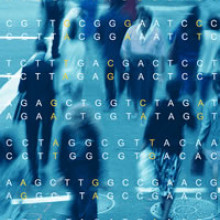
00:59 - Saskia Sanderson - Gene testing issues
Saskia Sanderson - Gene testing issues
with Saskia Sanderson, UCL
Kat:: Thanks to advances in technology, a day when we might each have our own personal genome at our fingertips is coming ever closer. But what can people do with this information, and what are the issues involved? To get to grips with this brave new genetic world, I spoke to Dr Saskia Sanderson from the Health Behaviour Research Centre at UCL and the Icahn School of Medicine at Mount Sinai in New York. To start with, what exactly do we mean by genetic testing?
Saskia:: So, genetic testing really ranges from single genetic tests for gene variants that we really know quite a lot about - a good example of that would be the BRCA1 and 2 gene variants that were strongly associated with risk of breast cancer - then you have other genetic tests for single gene variants which really, we use for research purposes where you're looking at single gene variants associated with a very slightly increased risk of a common complex disease like heart disease, lung cancer, that kind of thing. But those kinds of tests have also for the last few years been available direct to consumer.
Kat:: So, to the general public, you can get one on the internet basically.
Saskia:: Yes, although that has recently changed. There have been developments recently that have made that less available to people. But I think we might be almost a moment in time where it's less available. I think it's probably going to come back again. We also have genetic testing for ancestry which a lot of people are really interested in at the moment. So many people are interested in genealogy. Actually, that is a very booming industry if you like.
Kat:: The kind of recreational genetics.
Saskia:: Yes, but recreational, very specifically about where did you come from, very specifically about that side of things rather than the disease risks side or this will help you about your health.
Kat:: It's basically, "Am I a Viking?"
Saskia:: Yes, exactly that.
Kat:: And now, we're starting to move to an era where we have the ability to sequence entire genomes. People can have their whole genomes sequenced. Is that something that's starting to become more common and will it become commonplace in the future?
Saskia:: I think we're certainly saying more and more of it obviously. I mean, we know that of course, it's only 15 years ago, it costs $3 billion and took 15 years to sequence the first human genome. You can now do it for $5,000 and it takes a few days. So, it's certainly becoming clearly more commonplace. It's happening a lot more for research purposes. Many people are having their genome sequenced now as part of research studies. We're certainly seeing more of it, but I wouldn't say it's commonplace. We're still a long way to go. We're still a long way from having that, all of us having our whole genome on a USB stick that we take to our doctor and carry around with us. That's not going to happen for a while, but more and more people are having it done. In the UK, last year, we now have the launch of the 100,000 Genome project where there are going to be thousands of people within the NHS having their genome sequenced for both clinical and research purposes.
Kat:: So, it's likely that in the future, more and more of us in the general public are going to have to grapple with quite complex genetic data. We hear the language of genes in the headlines, "Gene for this, gene for that." People are going to have to start engaging with genomic testing and genetic testing. What do you think are some of the kind of issues that are going to come up or are coming up already?
Saskia:: I think what you just said is one of the first things that we need to make sure that people do start - that we start getting across which is, there are no "genes for" anything. We have variants within genes that affect how the gene works, how the protein product works and basically, it's these variations in your DNA that affect your disease risk, affect how tall you are. There aren't genes "for" heart disease. There aren't genes "for" disease. There are genes that do things and sometimes they work better and sometimes they work worse. So, I think that's obviously one of the things that we need to make sure that it's a starting point. That's where we need to make sure people understand.
Many people argue that genetic information is just one more piece of health information in the way that your blood pressure is information about your risk of disease and this is another piece of information. I think in many ways that's true, but I do think genome sequencing takes us to a whole other level where people are going to have to get their heads around a large amount of data. That said, there is another important consideration which is that, I think we're used to thinking about testing as a sort of one-time test. What we may also sort of want people gradually to kind of get their heads around as well is that having your genome sequenced might be something that happens at one point and then it's a resource. It's not actually something that you get all the results from in one go.
Kat:: "Here you are, off you go."
Saskia:: That's right. This is you on your USB stick. Actually, what might happen and what's probably more likely is that you do have your genome sequence but then that can be accessed at different times in your life and for different purposes. So, then you access it perhaps when you're of reproductive age - thinking about having children. Perhaps when it looks like certain diseases develop. With different things in your life, different times in your life where different bits of your genome or looking for different things within your genome will be important. So, it could also be helpful to start thinking about your genome as a resource rather than your genome sequence and sequencing of your genome, more as a resource rather than a test.
Kat:: We know that we're a product of nature and nurture, that we have genes that they interact with our environment and the things that we do, our lifestyle. So, when people get this kind of information, what do they do with it?
Saskia:: So, I think the question partly depends on what you mean by this information. The research that we've been doing, we started about 10, 15 years ago, was looking at how people responded to getting genetic risk information about their risk of lung cancer. So here, we're clearly talking about something, a disease. It very clearly has a strong environmental behavioural component - smoking. But also, I think people know. They say to us, "I know that my grandmother smoked 20 a day, maybe 60 a day until she was 80 and she didn't die of lung cancer." And therefore, it's not all behavioural. It's not all caused by smoking. They know that something else going on and that thing could well be of course, your genetic risk is what you bring genetically to the table.
We still don't know very much about the genetics of diseases like lung cancer. We still don't know, but we know something. We know a lot more than we did and we're going to know more in the coming years. So, I think that one way to answer that question is that people already have some understanding that disease is complex, life is complex. And that maybe, by bringing genetics into the story, that could actually be a helpful thing because it is part of the story and to kind of ignore that or pretend that it's not part of the story, even when it's in the context of something that which is so clearly affected by your behaviour like lung cancer - smoking - that that may just be something that we have to deal with.
Kat:: For example, the more that we understand about our genomes and things like the risk of diseases like cancer, and is there a risk that someone is just going to go, "It's all in my genes. There's nothing I can do" or "Well, my granny smoked and drank like a fish and she was fine, so I didn't need to bother."
Saskia:: We say so much about this in my field. It has this term of genetic determinism, genetic fatalism. I have to say, we absolutely cannot find evidence of it when we do the empirical research, which we have done. We give genetic risk information about lung cancer to smokers, albeit very small pieces of risk information that's influencing your risk this way or that way of small amount. There is no evidence that whether then we tell a smoker that they have a slightly lower risk of lung cancer than somebody else based on their genes that they then go out and say, "Well, it's alright then I can smoke as much as I want." And similarly, when we tell smokers that they have a slightly increased risk of lung cancer, they don't go, "Oh my goodness! It's all in my genes. There's nothing I can do about it."
We've seen that in lung cancer. Others have seen it in all sorts of areas. We're still at the beginning of research in this field but I have to say, nobody can find evidence of that so far. And so, I do think it's important for people to recognise and I think truthfully also, I think if I tell somebody, if I give somebody some genetic risk information and they go off and think that - that they go from thinking is safe for them to smoke or they go off and think that they're doomed - I've done a terrible job of communicating that information to them and so, clearly, it's important we communicate the information well. I have to say, across all the research studies that I've seen, I have yet to see a study where people have gone off and thought either of those things. So, I think empirically, the evidence for that so far simply isn't there.
Kat:: So, you can't use your genome as an excuse for not trying to live a healthy lifestyle.
Saskia:: No!
Kat:: That was Saskia Sanderson from UCL and the Icahn School of Medicine.
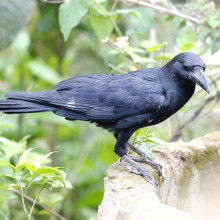
10:25 - Genes pick crow partners
Genes pick crow partners
Take a look at your partner, if you have one - notice anything similar? Well, you definitely would do if you're a crow, according to new research from scientists at Uppsala University in Sweden. Writing in the journal Science, the team have discovered that crows pick partners that look like themselves, and that this behaviour is rooted in their genetic makeup.
Crows come in two colours - black and grey, and they tend to pick partners that are the same. The scientists focused on black carrion crows and grey hooded crows, which both seem to be extremely similar on a genetic level, but are obviously different colours. But there's a small strip of land across Europe and Asia where they interbreed, allowing researchers to study how the populations split.
Through careful studies of the two crows' genomes and developing feathers, the researchers discovered that out of more than 1 billion DNA 'letters', the two crows genomes differed significantly in only 82 key regions, 81 of them in genes involved in colour and visual perception. The scientists suggest that the crows' colouring is coupled to their ability to detect it, so they pick similar-coloured mates and help to maintain the differences between the populations. The finding helps to answer the puzzle of how new species emerge and become established from slight genetic changes, allowing populations to split into new species over time that can then evolve independently.
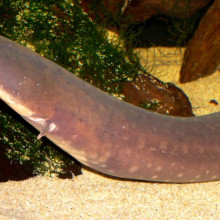
11:46 - Electric evolution
Electric evolution
Writing in the journal Science, a team of US researchers has discovered how the electric eel got its jolt. Electric fish, including electric eels, use modified muscle cells to generate electrical currents for stunning prey, defending themselves, communication and sensing. There are hundreds of species of electric fish worldwide, divided into six different broad families, or lineages, and it wasn't known whether their shocking abilities evolved just once a long time ago, or several times more recently in the different groups.
The scientists identified the molecular pathways each group uses to generate their electrical organs, and discovered that although each of the six groups uses broadly the same biological 'nuts and bolts' to build them, they all evolved the ability independently over the course of time in different environments.
Impressively, an electric eel can produce up to 600 volts, and is best described by lead researcher Professor Michael Sussman as "A frog with a built-in five-and-a-half-foot cattle prod." He and his team now hope their findings will shed light on ways to manipulate muscle cells to generate electrical energy which might one day be useful for powering bionic devices or other uses.

12:52 - Learning to fly
Learning to fly
Researchers have uncovered a surprising genetic connection between the development of language in humans and learning in fruit flies, publishing their findings in the journal PLoS One...
In 2007, the team of researchers, based at the University of Missouri, discovered a gene in fruit flies that is very similar to a human gene called FoxP2, which is thought to play a role in human language and learning.
In this new work, they studied flies with a modified version of FoxP2, and tested their ability to learn how to do a simple flight-based task, known as operant learning, similar to learning by trial and error. Insects with a faulty version of the gene couldn't learn how to do the task, while normal flies performed just fine.
Looking closer, they also found subtle changes in the brains of flies with modified gene. The ancestors of humans and fruit flies split around 500 million years ago, but because the same gene is conserved in both, and seems to have a similar function, the results reveal more about the genetic basis of communication and learning across the animal kingdom.
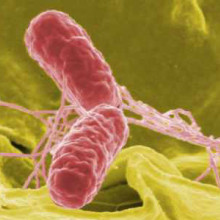
13:51 - Salmonella's Achilles' heel
Salmonella's Achilles' heel
With barbeque season upon us, some unlucky people can expect to find themselves counted amongst the thousands that get Salmonella food poisoning every year in the UK. Most people manage to ride out the infection, but it can be very dangerous and even fatal in the very old and very young. But according the new research published in the journal PLoS Pathogens this month, scientists may have found Salmonella's Achilles' heel.
The researchers discovered that Salmonella-causing bacteria are highly dependent on a particular nutrient - a combination of an amino acid and sugar called fructose-asparagine, found in the gut. Without it, they become 1,000 times less effective at sustaining disease than when they're fully fed. Unexpectedly, this is the first time that fructose-asparagine has been found to be a food source for any kind of organism, and it's very unusual for bacteria to be so dependent on a single food source.
Next, the scientists identified a cluster of five genes responsible for transporting the chemical into the Salmonella bacteria and chopping it up so they can use it as fuel. These could potentially be targets for drugs to halt the infection while leaving other good bacteria, which don't depend on fructose-asparagine. The team is now working to figure out exactly when this nutrient is most important for Salmonella's survival, and which human foods provide rich sources, which could also help to relieve the misery of food poisoning. But in the meantime, please take care over your food hygiene if you're planning a barbie this summer.

15:13 - Eucalyptus genome revealed
Eucalyptus genome revealed
And finally, eucalyptus trees are more than just food for hungry koalas. Made up of more than 700 species grown in 100 countries around the world, they're also a useful, fast growing source of biofuels and hardwood as well as antiseptic oils - not to mention traditional Aboriginal didgeridoos. Now a consortium of more than 80 researchers from 18 countries have decoded the genome sequence of Eucalyptus grandis.
Reporting in the journal Nature, the researchers trawled through the trees' 36,000 genes, homing in on those involved in producing cellulose and lignin - the tough molecules that are used to create paper, pulp and other biomaterials. The scientists hope that by understanding how eucalyptus trees make these woody fibres, grow so fast and adapt to different environments, they could shed light on improving trees elsewhere, particularly as they adapt to a changing climate.
And as an added bonus, the researchers also uncovered the genes that create oily molecules called terpenes, responsible for the eucalyptus' distinctive smell. With a bit of tweaking, these terpenes could potentially be used to feed into processes for making jet fuel. So maybe one day your plane trip to see koalas in their native habitat could be fuelled by the trees they feed on.

16:37 - Susie Meisel - Obesity gene tests
Susie Meisel - Obesity gene tests
with Susie Meisel, UCL
Kat:: Now it's time to return to the subject of genetic testing. Dr Susie Meisel, also at UCL's Health Behaviour Research Centre, spent her PhD finding out whether providing people with genetic test information could help motivate them to lose weight. I started by asking her more generally about some of the challenges of understanding the glut of genetic information we now have.
Susie:: I think at first, when the sequence was revealed, people thought it would be quite - I wouldn't call it simple, they probably thought it's going to be complicated - but from the experience that they have with genetics up to that point which is mainly Mendelian disorders where you get a certain probability to have the disease versus not. I think people really expected that once we know the genetic code, that then we can really like understand why people get ill, and that it would be not necessarily there's one gene for this, but generally, they would have a pretty good idea why someone is being ill. Then the reality of course was very different. I think once the genetic code was revealed, actually, it turned out that it's much more complicated than just, you know, a few genes interacting and this is how you get cancer. I think when we started out, we were quite naïve about how complex human beings actually are and how complex disease can be.
Kat:: In the area that you did in your PhD, it was kind of understanding genetic testing and the implications of that for people understanding obesity. Tell me more about that work.
Susie:: That was quite interesting because it was more like a 'proof of principle' study. We chose obesity because it's a condition that is familiar to a lot of people. It is very strongly implicated by genes, but it's not this condition where it's one gene that causes you to become overweight. In fact, it is a lot of genes. At that time when I started my PhD, FTO was the gene that was the best researched one, which had a small effect but on a population level then would have a big impact. I think this is why we chose it because it's a very emotional issue for people - why they are overweight, why they are at a certain weight, why they can't lose weight as easily as other people.
Kat:: So, tell me a bit about the study. What was the gene variation you were looking at?
Susie:: So FTO, which was original called the fused-toe and obesity gene and now, it's fat mass and obesity gene. It's a gene which comes in two variants. The higher risk variant on an individual level, it causes you to be about 1 kilo heavier. So, if you're a homozygous, you have two variants of that allele then you are about 3 kilos heavier and have a 20 per cent higher lifetime risk to become overweight and obese than someone who hasn't got the higher risk alleles.
Kat:: How did you do the study?
Susie:: I did a randomised control trial as part of my PhD which had giving people this sort of genetic test feedback, the FTO result - so, it's only one gene - and generic weight control advice in the form of a leaflet that we designed specifically for this study. And the intervention group got feedback and advice, and the control group only got the advice leaflet.
Kat:: What did you find? What were people's attitudes? Did having a gene variation that said they were more likely to be obese going, "Yep, that's it. I'm going to lose this weight. I'm going to battle it."?
Susie:: Yes. It was quite interesting because people who did have the higher risk variants were indeed more motivated than those who had the lower risk variants. However, there was no difference with those who had the lower risk variants to the control group. And so, this really indicates that people can be more motivated if they get these higher risk results. However, it doesn't reduce motivation and cause disengagement or genetic fatalism. Sort of this, "Oh, I've got the higher risk gene variants and therefore, I can't do anything anyway" or "I don't have the higher risk gene variants and therefore, I will be immune to becoming overweight." This is not how people think, and I think that became quite clear.
Kat:: That's quite interesting because that's almost been a sort of slight perception in the media that, if you can blame your genes, why bother trying to be healthy?
Susie:: Yes. That's sort of perpetuated. However, when we did some research as well with overweight people specifically and their reactions to receiving gene feedback, most of them took part to kind of learn something about themselves and to understand their condition better. They really found it was really a relief of guilt and shame and self-blame. "So, it's not all me and my responsibility. It is also my biology and I'm battling my biology." I think that sort of realisation made them then more motivated to really go on and do something about it. I think that's something that is for us as researchers reassuring that people don't have, at least for common complex diseases, it doesn't seem necessarily that it's all genes or it's all behaviour, but it's more complex. They do understand that very well.
Kat:: As in your research and in other research that's been done, even if people know something and are motivated, it's very hard to actually do something, put the cream cake down, go for a run. Do you think that genetic information can actually make people change their behaviour or is it just a nice idea?
Susie:: I think from my research, I have to say, unfortunately, it seems to be just a nice idea at the moment. We didn't find any impact on behaviour change. However, I'm not sure because as you said, behaviour change is a very complex thing. So, this was information for one gene, for a complex disease and I don't know, having that little bit more information of what difference it actually could make.
Kat:: It's interesting that you mentioned that people can know things about their genome may be not motivated to change, but also, a good indicator of what's in our genes is our family history. As well, you can see that say, your father had a heart attack, but you may or may not choose to do that. Obviously, our genes aren't just our own gene. They are our family's genes too.
Susie:: Yes, that's a very important issue I think that comes up now with whole genome sequencing, especially more and more with that. Of course, we've always known that having in close look at your family history would actually be more useful than taking a 23andMe SNP based test especially for diseases. However, of course, for whole genome sequencing, it's then different because it's not just your genome. It's your family as well and it's a big question about how we communicate and who is communicating this because it might be that you want to choose testing but then your sister doesn't want to.
So, what do we do then? If anything is found, will we then not tell the sister because she didn't want to know? Or will we tell the sister and cause potential distress because she's burdened with something. But equally, if the person that had the testing is not telling, maybe she will feel guilty or he will feel guilty about not communicating that sort of information. So, I think there are lots of issues that really need to be thought of and sorted out now where whole genome sequencing is really on the horizon, and it is definitely here to stay. So, there's no question about that.
Kat:: And one of the incredible things is how fast things are moving and how slow things like legislation and policy are being to catch up. What do you see are the really, really key urgent issues that need to be sorted as quickly as possible whether that's research or policy?
Susie:: It's really important to think about those ethical implications very well if you go down that routes of, like testing and it is about consent. How are we consenting people? I think it will really be, how do we communicate very complex information to people so they can then make an informed decision about what they would choose for themselves, but also perhaps for their families?
Kat:: And do you think we will move towards the kind of the Gattaca scenario where a child will have the genetic test done at birth and that will set the course of their life?
Susie:: Well, I'm cautious about that. I would say at this point in time, probably not and hopefully, not. But I think that genetics will play a much bigger role in medicine in years to come. Of course, some people say the earlier you know, the earlier you can intervene. But that's again something for legislation and I think researchers and policy makers to very carefully think about what the implications of that would be also for a child's life, and a child doesn't have the right to consent yet. They can't, so it's the parents and there are some issues about that as well that one has to think about before we move on to Gattaca.
Kat:: That was Susie Meisel from UCL.
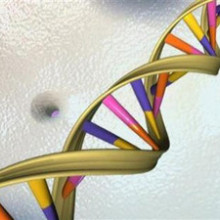
Can missing DNA be replaced?
Dr. Sarah South, from the University of Utah,explains to Kat Arney whether missing DNA can be replaced...
Sarah:: The short answer is that it's not yet possible to do this for a couple of reasons. There has been some advances in the idea of restoring missing genes back to cells. But these advances have been primarily in situations where there is only a single gene that is not working or missing. We can use a harmless virus as a way of carrying that gene into some cells because viruses naturally have the ability to integrate the DNA they carry into their host cells. However, viruses can't carry the number of genes that would be missing in a patient with Wolf-Hirschhorn syndrome. Also, viruses only infect a subset of cells and for this condition, there are many different parts of the body that are affected and many different cells within the body that need to have these genes in order to function normally. Basically, we're not able to get the number of genes necessary into the cells and to target the number of cells that need to be targeted. The other problem is timing. In some genetic conditions, you may be able to introduce the genes back into those cells and yet, that may still not resolve the clinical symptoms. The clinical symptoms may be there because those specific genes were necessary at an earlier time of development such as during prenatal development.
Kat:: Thanks to our listener Deon Davis, Dr Sarah South and Harriet Johnson. And if you've got any questions about genes, DNA and genetics, just email them to me at genetics@thenakedscientists.com.

28:20 - Gene of the month - Scribble
Gene of the month - Scribble
with Kat Arney
Kat:: And finally it's time for our gene of the month, and this time it's Scribble. It was originally identified in fruit flies, but similar genes are found across a wide range of organisms, from humans to parasites. Scribble is involved in cell polarity - how cells tell which way is up. This is vital for building a body correctly, and also important in processes such as cancer.
In fact, Scribble is a type of gene known as a tumour suppressor - experiments in mice have shown that it's normally involved in making breast tissue develop normally and prevents breast cells from developing into cancer. In turn, faults in Scribble increase the chances of breast tumours developing. At the other end of the spectrum, researchers are investigating the molecules that interact with Scribble in schistosome parasitic worms, responsible for schistosomiasis. This could shed light on future drugs to treat the disease, which affects more than 2 million people worldwide.










Comments
Add a comment